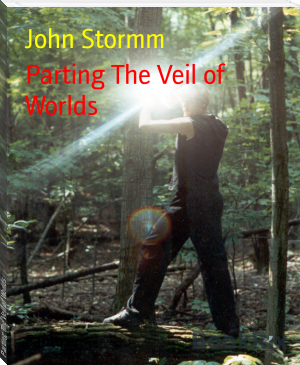The Well at the World's End: A Tale, William Morris [rainbow fish read aloud TXT] 📗

- Author: William Morris
Book online «The Well at the World's End: A Tale, William Morris [rainbow fish read aloud TXT] 📗». Author William Morris
The wild men, who, save for wide shields which they bore, were but evilly armed, mostly in skins of beasts, made no countenance of defence, but fled all they might towards the steep slopes of the valley, and then turned and fell to shooting; for the companions durst not pursue in haste lest they should be scattered, and overwhelmed by the multitude of foemen; but they drew up along the south side of the valley, and had the mastery of the road, so that this first bout was without blood-shedding. Albeit the thieves still shot in their weak bows from the hill-side, but scarce hurt a man. Then the bowmen of the fellowship fell to shooting at the wild men, while the men-at-arms breathed their horses, and the sumpter-beasts were gathered together behind them; for they had no dread of abiding there a while, whereas behind them the ground was broken into a steep shaly cliff, bushed here and there with tough bushes, so that no man could come up it save by climbing with hand and knee, and that not easily.
Now when the archers had shot a good while, and some of the thieves had fallen before them, and men were in good heart because of the flight of the wild men, Ralph, seeing that these still hung about the slopes, cried out: "Master Clement, and thou Captain, sure it will be ill-done to leave these men unbroken behind us, lest they follow us and hang about our hindermost, slaying us both men and horses."
"Even so," quoth the captain, who was a man of few words, "let us go. But do thou, Clement, abide by the stuff with the lads and bowmen."
Then he cried out aloud: "St. Christopher to aid!" and shook his rein, and all they who were clad in armour and well mounted spurred on with him against the strong-thieves. But these, when they saw the onset of the horsemen, but drew a little up the hill-side and stood fast, and some of the horses were hurt by their shot. So the captain bade draw rein and off horse, while Clement led his bowmen nigher, and they shot well together, and hindered the thieves from closing round the men-at-arms, or falling on the horses. So then the companions went forward stoutly on foot, and entered into the battle of the thieves, and there was the thrusting and the hewing great: for the foemen bore axes, and malls, and spears, and were little afraid, having the vantage-ground; and they were lithe and strong men, though not tall.
Ralph played manfully, and was hurt by a spear above the knee, but not grievously; so he heeded it not, but cleared a space all about him with great strokes of the Upmeads' blade; then as the wild men gave back there was one of them who stood his ground and let drive a stroke of a long-handled hammer at him, but Ralph ran in under the stroke and caught him by the throat and drew him out of the press. And even therewith the wild men broke up before the onset of the all-armed carles, and fled up the hill, and the men-at-arms followed them but a little, for their armour made them unspeedy; so that they took no more of those men, though they slew some, but turned about and gathered round Ralph and made merry over his catch, for they were joyous with the happy end of battle; and Clement, who had left his bowmen when the Companions were mingled with the wild-men, was there amidst the nighest.
Said Ralph to him: "Well, have I got me a servant and thrall good cheap?" "Yea," said Clement, "if thou deem a polecat a likely hound." Said the Captain: "Put thy sword through him, knight." Quoth another: "Let him run up hill, and our bowmen shall shoot a match at him."
"Nay," said Ralph, "they have done well with their shooting, let them rest. As to my thrusting my sword through the man, Captain, I had done that before, had I been so minded. At any rate, I will ask him if he will serve me truly. Otherwise he seemeth a strong carle and a handy. How sayest thou, lad, did I take thee fairly?" "Yea," said the man, "thou art a strong lad."
He seemed to fear the swords about him but little, and forsooth he was a warrior-like man, and not ill-looking. He was of middle height, strong and well-knit, with black hair like a beast's mane for shagginess, and bright blue eyes. He was clad in a short coat of grey homespun, with an ox-skin habergeon laced up over it; he had neither helm nor hat, nor shoes, but hosen made of a woollen clout tied about his legs; his shield of wood and ox-hide lay on the ground a few paces off, and his hammer beside it, which he had dropped when Ralph first handled him, but a great ugly knife was still girt to him.
Now Ralph saith to him: "Which wilt thou—be slain, or serve me?" Said the carle, grinning, yet not foully: "Guess if I would not rather serve thee!" "Wilt thou serve me truly?" said Ralph. "Why not?" quoth the carle: "yet I warn thee that if thou beat me, save in hot blood, I shall put a knife into thee when I may."
"O," said one, "thrust him through now at once, lord Ralph." "Nay, I will not," said Ralph; "he hath warned me fairly. Maybe he will serve me truly. Master Clement, wilt thou lend me a horse for my man to ride?" "Yea," said Clement; "yet I misdoubt me of thy new squire." Then he turned to the men-at-arms and said: "No tarrying, my masters! To horse and away before they gather gain!"
So they mounted and rode away from that valley of the pass, and Ralph made his man ride beside him. But the man said to him, as soon as they were riding: "Take note that I will not fight against my kindred." "None biddeth thee so," said Ralph; "but do thou take heed that if thou fight against us I will slay thee outright." Said the man: "A fair bargain!" "Well," said Ralph, "I will have thy knife of thee, lest it tempt thee, as is the wont of cold iron, and a maiden's body." "Nay, master," quoth the man, "leave me my knife, as thou art a good fellow. In two hours time we shall be past all peril of my people, and when we come down below I will slay thee as many as thou wilt, so it be out of the kindred. Forsooth down there evil they be, and unkinsome."
"So be it, lad," said Ralph, laughing, "keep thy knife; but hang this word of mine thereon, that if thou slay any man of this fellowship save me, I will rather flay thee alive than slay thee." Quoth the carle: "That is the bargain, then, and I yeasay it." "Good," said Ralph; "now tell me thy name." "Bull Shockhead," said the carle.
But now the fellowship took to riding so fast down the slopes of the mountains on a far better road, that talking together was not easy. They kept good watch, both behind and ahead, nor were they set upon again, though whiles they saw clumps of men on the hill-sides.
So after a while, when it was a little past noon, they came adown to the lower slopes of the mountains and the foot-hills, which were green and unstony; and thereon were to be seen cattle and neatherds and shepherds, and here and there the garth of a homestead, and fenced acres about it.
So now that they were come down into the peopled parts, they displayed the banners of their fellowships, to wit, the Agnes, the White Fleece, the Christopher, and the Ship and Nicholas, which last was the banner of the Faring-knights of Whitwall; but Ralph was glad to ride under the banner of St. Nicholas, his friend, and deemed that luck might the rather come to him thereby. But they displayed their banners now, because they knew that no man of the peopled parts would be so hardy as to fall upon the Chapmen, of whom they looked to have many matters for their use and pleasure.
So now that they felt themselves safe, they stayed them, and sat down by a fair little stream, and ate their dinner of such meat and drink as they had; and Ralph departed his share with his thrall, and the man was hungry and ate well; so that Clement said mockingly: "Thou feedest thy thrall over well, lord, even for a king's son: is it so that thou art minded to fatten him and eat him?" Then some of the others took up the jest, and bade the carle refrain him of the meat, so that he might not fatten, and might live the longer. He hearkened to them, and knit his brows and looked fiercely from one to the other. But Ralph laughed aloud, and shook his finger at him and refrained him, and his wrath ran off him and he laughed, and shoved the victual into him doughtily, and sighed for pleasure when he had made an end and drunk a draught of wine.
CHAPTER 22 Ralph Talks With Bull Shockhead
When they rode on again, Ralph rode beside Bull, who was merry and blithe now he was full of meat and drink; and he spake anon: "So thou art a king's son, master? I deemed from the first that thou wert of lineage. For as for these churls of chapmen, and the sworders whom they wage, they know not the name of their mother's mother, nor have heard one word of the beginner of their kindred; and their deeds are like unto their kinlessness."
"And are thy deeds so good?" said Ralph. "Are they ill," said Bull, "when they are done against the foemen?" Said Ralph: "And are all men your foemen who pass through these mountains?" "All," said Bull, "but they be of the kindred or their known friends."
"Well, Bull," said Ralph, "I like thy deeds little, that thou shouldest ravish men and women from their good life, and sell them for a price into toil and weariness and stripes."
Said Bull: "How much worse do we than the chapmen by his debtor, and the lord of the manor by his villein?" Said Ralph: "Far worse, if ye did but know it, poor men!" Quoth Bull: "But I neither know it, nor can know it, nay, not when thou sayest it; for it is not so. And look you, master, this life of a bought thrall is not such an exceeding evil life; for oft they be dealt with softly and friendly, and have other thralls to work for them under their whips."
Ralph laughed: "Which shall I make thee, friend Bull, the upper or the under?" Bull reddened, but said naught. Said Ralph: "Or where shall I sell thee, that I may make the best penny out of my good luck and valiancy?" Bull looked chopfallen: "Nay," said he in a wheedling voice, "thou wilt not sell me, thou? For I deem that thou wilt be a good master to me: and," he broke into sudden heat hereat, "if I have another master I shall surely slay him whate'er betide."
Ralph laughed again, and said: "Seest thou what an evil craft ye follow, when thou deemest it better to be slain with bitter torments (as thou shouldest be if thou slewest thy master) than to be sold to any master save one exceeding good?"
Bull held his peace hereat, but presently he said: "Well, be our craft good or evil, it is gainful; and whiles there is prey taken right good, which, for my part, I would not sell, once I had my hand thereon." "Yea, women?" said Ralph. "Even so," said Bull, "such an one was taken by my kinsman Bull Nosy but a little while agone, whom he took





Comments (0)